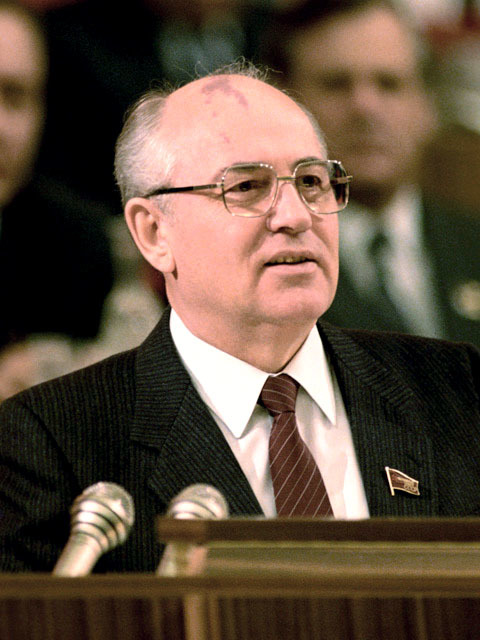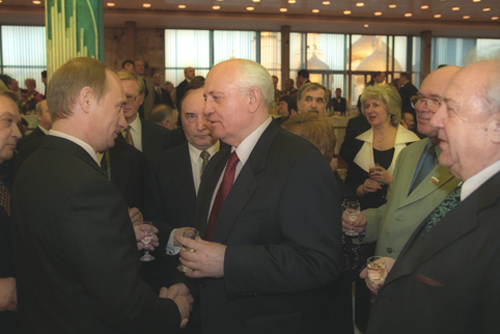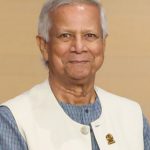The death of former Russian president Mikhail Gorbachev on August 30 2022 of course sparked strongly mixed reaction around the world.
And perhaps unsurprisingly reopened wildly split debate about his legacy, coming as it did in the midst of a new war between Russia and Ukraine – a war which Gorbachev himself saw as an act that completely destroyed his political legacy and aspirations.
Anna Zelkina is a “child of perestroika” and a specialist in Islam and the politics of the Caucasus and Central Asia.
She has these reflections on the death of Mikhail Gorbachev.
From Anna Zelkina, former research associate at SOAS Centre of Contemporary Central Asia and the Caucasus
September 2022
I belong to a generation that is commonly referred to as “the children of Perestroika.” I was sixteen years old when the death of Brezhnev in 1983 ushered in the kaleidoscopic rota of first party secretaries that seemed to signal an end to the apparently eternal monolith of the Soviet regime.
When, two years later, in 1985 a ‘youngish’ 54-year-old Mikhail Gorbachev became the leader of the country, everybody was expecting a transformation of one sort or another. The older generation were hoping for a restoration of the ‘strong hand’ associated with Stalin’s rule; those who had come into adulthood during Khrushchev’s thaw were hoping for a liberalisation akin to the one they had lived through in their twenties and early thirties; and my friends and I, barely out of childhood, wanted to break away from the dogmatism of our schoolbooks and explore some degree of intellectual and individual freedom promised by the new political concepts of ‘glasnost’ and ‘perestroika’.
None were satisfied with what was to follow. Some cheered Gorbachev and urged him to bring forth more daring changes, others resented and feared his political and economic reforms and almost everyone treated him with distrust and suspicion. While in the West, he came to be loved and admired for displaying curiosity, warmth and a sense of humour – in short, normal human behaviour – in the Soviet Union these same characteristics, as well as his obvious love and devotion to his wife Raisa, were sneered at by people who had been raised to admire the ‘steel qualities’ of statesmen who never showed emotion.
All these diverse opinions of the man who has been credited with bringing the end of the Cold War and the collapse of the ‘evil empire’ resurfaced when Gorbachev passed away on 30th August this year. While the obituaries throughout the world almost universally hail him as a leader who left a long legacy as a peacemaker and helped to make the world a better and safer place, in the former Soviet bloc those critical of his policies exploded in ugly
and somewhat misplaced expressions of open hatred. And once again, this hatred is emanating from polar directions.
The Defence Minister of Lithuania, Avydas Anusauskas, described Gorbachev as “a criminal who ordered a ruthless crackdown on peaceful protests in Vilnius, Tbilisi, Almaty, Baku and other cities,” without pausing to reflect on the fact that with any other Soviet leader in power there would have not even been any possibility for these protests to take place.
The leader of Russia’s Communist Party, Genady Zyuganov, blamed Gorbachev for the demise and disintegration of the Soviet Union and announced that he was “one leader in a thousand-year Russian history who had brought to all its nations as well as its friends and allies absolute misery, grief and misfortune,” disregarding the reality of the all-
encompassing crisis faced by the USSR at the time when Gorbachev came to power.
President Putin’s official spokesman, Dmitry Peskov, while paying lip service to Gorbachev as a ‘unique politician’ spoke with the air of condescension about his unjustifiably naïve belief in the possibility of peaceful coexistence with the “blood-thirsty West.” Putin himself, while sending his condolences to the family and friends of Mikhail Gorbachev, refused him a state funeral and said that he was ‘too busy’ to come pay his respects.
In contrast, those of my generation whose world had been opened up by Gorbachev’s reforms, however indecisive and half-hearted they seemed to us at the time, mourn him not just as a man and important historical figure, but as a symbol of an era when Russia had a chance to become an integral part of the free, democratic world, share in
liberal values and respect human rights both of its own citizens and other nations.
Dmitry Muratov, the last winner of the Nobel Peace Prize and one of the leading Russian journalists, spoke for all of us in crediting Gorbachev with the gift of “thirty years of peace without the threat of global and nuclear war.”
This gift of peace and sense of nuclear security was ended in February this year by the Russian aggression against Ukraine, which Gorbachev himself saw as the act that completely destroyed his political legacy and aspirations.
Reflecting on this legacy as well as its reversal by his successors I have come to believe that it was the human characteristics that people in the Soviet Union had found so unnatural to a state leader, that played a decisive role in shaping Gorbachev’s policies and ultimately his legacy.
Neither a profound thinker, nor a charismatic leader, he was hardly a true visionary – according to his own testimony, when he set out to implement his reforms, he had not envisaged that they could lead to the collapse of the Soviet system and the disintegration of the USSR.
Still, he was key in setting in motion a process of rare magnitude and consequences.
Once humanity was brought into the public domain, the system – one built on hypocrisy, distrust of any independent thought and brutality in suppressing it, disrespect of human life and human dignity – collapsed like a house of cards.
Unlike his dictatorial predecessors and successors, he had not clung to power at all costs in pursuit of personal wealth and lifelong immunity and he put peace above his personal ambitions.
It took a corrupt and unprincipled dictator with no hint of humanity to bring back the cycle of violence and restore the totalitarian system and expansionist nature of the country Gorbachev tried to reform.
Although his death after a long and debilitating illness at the age of 91 was not unexpected, it is nevertheless symbolic that it occurred so soon after the era in Russia’s history that he had helped to bring about ended in such a tragic and painful way.
Alongside the other ‘children of perestroika’, I mourn both the death of a man who had given us a chance for a better future, and the loss of hope that the current regime In Russia has brought upon its own people and the whole world.









